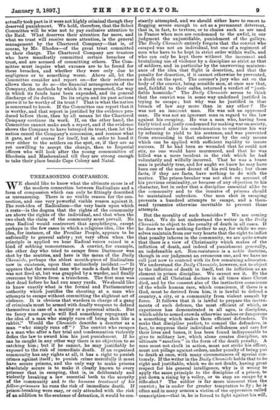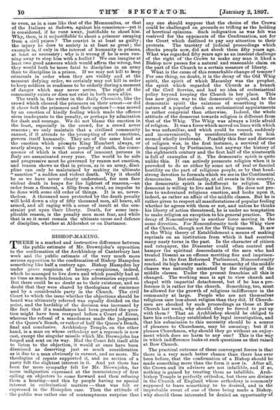UNREASONING COMPASSION.
WE should like to know what the ultimate cause is of the modern connection between Radicalism and a Form of compassion which can only be fittingly described as unreasoning. There is no visible reason for the con- nection, and one very powerful visible reason against it. The root-idea of Radicalism—the very basis upon which it rests—is the dogma that the rights of the community are above the rights of the individual, and that when the two clash the claim of the community must prevail. No true Radical would controvert that apophthegm, except perhaps in the few cases in which a religious idea, like the idea, for instance, of the Peculiar People, appears to be unfriendly to general safety ; yet very often when the principle is applied we hear Radical voices raised in a kind of sobbing remonstrance. A convict, for example, the other day who tried to escape from Dartmoor was shot by the sentries, and here is the moan of the Daily Chronicle, perhaps the ablest mouth-piece of Radicalism now in existence, upon that melancholy incident :—" It appears that the second man who made a, dash for liberty was not fired at, but was grappled by a warder, and finally overcome by blows from a truncheon. The first man was shot dead before he had run many yards. We should like to know exactly what is the formal and Parliamentary authority which justifies the shooting at a man who attempts to escape without committing the slightest act of violence. It is obvious that warders in charge of a gang of criminals must be armed with deadly weapons to defend themselves in case of a mutiny or a personal attack. But we fancy most people will find something repugnant in the idea of a man who simply runs off being shot like a rabbit." Would the Chronicle describe a deserter as a man "who simply runs off " ? The convict who escapes is a man who after a fair trial and condemnation violently defies the law to award him his just punishment. If he can be caught in any other way there is no objection to so catching him ; but if he cannot, he may justifiably be exposed to the risk of immediate death. If an organised community has any rights at all, it has a right to punish crimes against itself ; to punish crime mercifully it must have secure prisons, and the only way to make prisons absolutely secure is to make it clearly known to every prisoner that in escaping, that is, in deliberately and violently breaking a law essential both to the security of the community and to the humane treatment of his fellow-prisoners he runs the risk of immediate death. If prison-breaking were easy, or only attended with the risk of an addition to the sentence of detention, it would be con- stantly attempted, and we should either have to resort to flogging severe enough to act as a permanent deterrent, that is, in fact, to torture, or to chains such as are used in France when men are condemned to the awful, in our judgment the unjustifiable, punishment of the galleys. The Daily Chronicle entirely forgets that the convict who escaped was not an individual, but one of a regiment of men who have to be kept in strict order within walls, and who can only be kept there without the incessant and brutalising use of violence by a discipline as strict as that of soldiers, and in particular by the unswerving mainten- ance of the idea that flight is desertion, and that the penalty for desertion, if it cannot otherwise be prevented, is death on the spot. The coroner's jury who sat on the body of the convict, being sensible men, at once saw that, and, faithful to their oaths, returned a verdict of " justi- fiable homicide." The Daily Chronicle seems to think that the convict was in some way undefined justified in trying to escape ; but why was he justified in that, breach of law any more than in any other ? He was not an inntleent man. He was not an oppressed man. He was not an ignorant man in regard to the law against his escaping. He was a man who, having been fairly tried and justly condemned for making war on society, endeavoured after his condemnation to continue his war by refusing to yield to his sentence, and was prevented from succeeding in that endeavour by the only means which can be applied with sufficient rapidity to insure success. If he had been so wounded that he could not stir, no one would have murmured, and that he was killed was a mere incident in the risk which he had voluntarily and wilfully incurred. That he was a brave man is probably true, and for aught we know he may have been one of the most decent of his evil trade ; but those facts, if they are facts, have nothing to do with the matter. The prison-breaker was not shot on account of his previous criminality, or because of any objection to his character, but in order that a discipline essential alike to the community and to the inmates of prisons should be maintained unbroken. One man shot in escaping prevents a hundred attempts to escape, and a thou- sand tyrannies otherwise inevitable to prevent those attempts.
But the morality of such homicides ? We are coming to that. We do not understand the writer in the Daily Chronicle to object to the penalty of death in all cases. If he does we have nothing further to say, for while we our- selves maintain from our very hearts that the right to inflict that penalty inheres in the community, we are quite aware that there is a view of Christianity which makes of the infliction of death, and indeed of punishment generally, an indefensible act. Non-resistance is a noble doctrine, though in our judgment an erroneous one, and we have no call just now to contend with its few remaining advocates. We understand the Daily Chronicle, however, not to object to the infliction of death in itself, but its infliction as an element in prison discipline. We cannot see it. By the consent of all Christian doctors in all times since Christ died, and by the consent also of the instinctive conscience of the whole human race, which conscience, if there is a God, must be derived from him, it is lawful to defend a country, a city, or a community from violent assault by force. It follows that it is lawful to prepare the instru- ments of such defence, the most efficient of which, as experience has demonstrated in all ages, is discipline, which adds to armed crowds otherwise useless or dangerous a something which makes them efficient defenders. To make that discipline perfect, to compel the defenders, in fact, to suppress their individual selfishness and care for their lives and bones, it has been found indispensable to give to military law, which alone creates discipline, an ultimate " sanction " in the form of the death penalty. A man must not skulk in action, must not strike his officer, must not pillage against orders, under penalty of being put to death at once, with many circumstances of special con- tumely. If the writer in the Daily Chronicle holds that to be right and justifiable, which we do not doubt, having great respect for his general intelligence, why is it wrong to apply the same principle to the discipline of a prison, to put down a rising by a volley, or to atop an escape by a rifle-shot ? The soldier is far more innocent than the convict ; he is under far greater temptation to fly ; he is often and in many armies a victim of the oppression called conscription—that is, he is forced to fight against his will, br even, as in a case like that of the Memnonites, or that of the Italians at Sadowa, against his conscience—yet it is considered, if he runaway, Justifiable to shoot him'. Why, then, is it unjustifiable' to shoot a prisoner escaping from a civil prison? The convict is at least as guilty; the injury he does to society is at least as great ; the example is, if only in the interest of humanity in prisons, at least as necessary ; why is it-wrong if he is seen run- ning away to stop him with a bullet? We can imagine at least two good aniwers which would affirm the Wong, but they would both be snore fatal to discipline in an atmy than to discipline in a prison. If we may not kill to beep criminals in order when they are visibly and at the moment defying order, we certainly may not kill in order to keep soldiers in readiness to be orderly during a moment of danger which may never arrive. The right of the community exists or does not exist in both cases alike. The truth is, the writer in the Daily Chronicle, like the crowd which cheered the prisoners on their arrest—or did it cheer both the prisoners and their captors ?—was moved' by an emotion of kindly feeling which made the offence seem inadequate to the penalty, or perhaps by admiration for dash and courage. We do not blame the emotion in the least, especially in the crowd, for a crowd never reasons ; we only maintain that a civilised community cannot, if it attends to the prompting of such emotions, govern itself humanely. They are of the same kind as the emotion which prompts King Humbert always, or nearly always, to remit the penalty of death, the conse- quence of which is that scores of innocent persons in Italy are assassinated every year. The world to be Cafe and progressive must be governed by reason not emotion, and reason shows us that in prison, as in an -army, disci- pline can only be maintained by making its ultimate " sanction " a sudden and violent death. Why it should be so we have never clearly understood, for men face violent death in heaps for the lightest of reasons,—an order from a General, a fillip from a rival, an impulse to be done with some old order of things. It is so, never- theless. A thousand men protected by the death penalty will hold down a city of fifty thousand men, all brave, all armed, and all raging with a sense of insult at the con- straint put upon their liberty. Death, for some inex- plicable reason, is the penalty men most fear, and while that is so it must remain the ultimate cause and defence of discipline, whether at Aldershot or on Dartmoor.















































 Previous page
Previous page